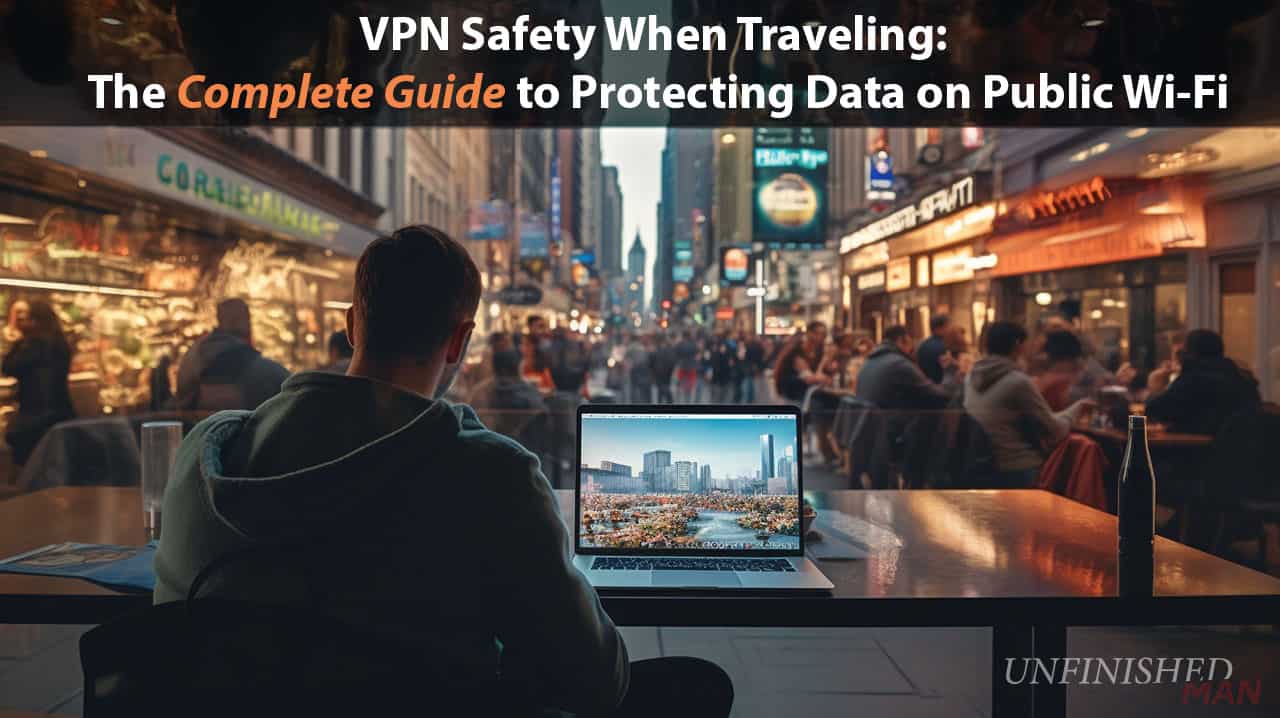Ever been anxious about your data’s safety while using public Wi-Fi networks as you travel? You’re not alone – I’ve felt that unease, too, especially considering the fact that unprotected Wi-Fi hotspots can lead to stolen credit card numbers and hacked emails.
In this helpful guide, we’ll dive into why a Virtual Private Network (VPN) can be your guardian angel when traveling and how to utilize it effectively. Stay tuned; your digital travel toolkit is about to get a vital upgrade!
Key Takeaways
VPNs create a private network from a public internet connection, providing privacy and anonymity for travelers.
Top-rated VPNs for international travel include NordVPN, Surfshark, PureVPN, ExpressVPN, and CyberGhost.
When selecting a travel VPN, consider factors such as the strength of the network, number of simultaneous connections, supported platforms, and ease of installation and setup.
Benefits of using a VPN while traveling include accessing blocked websites and apps, improving online security on Wi-Fi networks, avoiding roaming charges, and finding cheaper airfares and hotel deals.
Table of Contents
Understanding VPNs for Travel

VPNs create a private network from a public internet connection, providing privacy and anonymity for travelers.
How VPNs Work
Venturing into the world of Virtual Private Networks (VPNs) might seem complicated, but it’s actually straightforward. Picture your personal online data – think emails, bank details, or browsing history – traveling through a public tunnel from your device to its destination on the internet.
Without protection, this information can be easily viewed by prying eyes along transit. That’s where VPNs come in. Imagine VPN as a private armored vehicle for your data within that public tunnel.
It shields all your internet traffic from any interferences and protects it with high-grade encryption methods making it unreadable to potential snoopers such as hackers or even governmental agencies.
And not just that, unlike regular connections without VPNs, which expose you and reveal your location like an open book. A good VPN masks or ‘spoofs’ your true IP address ensuring you remain anonymous while surfing the net – no matter if you’re chilling at home or globe-trotting abroad!
The Importance of Using a VPN When Traveling
Traveling exposes us to exciting new environments, but it also leaves us vulnerable to online threats such as identity theft and corporate or governmental spying. That’s why incorporating a VPN into your digital travel toolkit is essential.
These Virtual Private Networks shield our every online action from prying eyes, offering an encrypted data protection fortress that makes our sensitive information virtually untraceable on open Wi-Fi networks.
It’s crucial to prioritize this level of cybersecurity, even if you’re simply checking email at the airport lounge or booking your next stay via Booking.com at a café hotspot. While inconvenient, the reality is anyone else sharing these public internet connections could potentially snatch our unprotected data out of thin air – turning what should be memorable experiences into digital nightmares with stolen credit card numbers or hacked emails.
Trust me; peace of mind knowing you have solid VPN security features in place will make tackling those crowded tourist spots much easier.
Top-Rated VPNs for International Travel

Here are some top-rated VPNs for international travel: NordVPN, Surfshark, PureVPN, ExpressVPN, and CyberGhost.
NordVPN
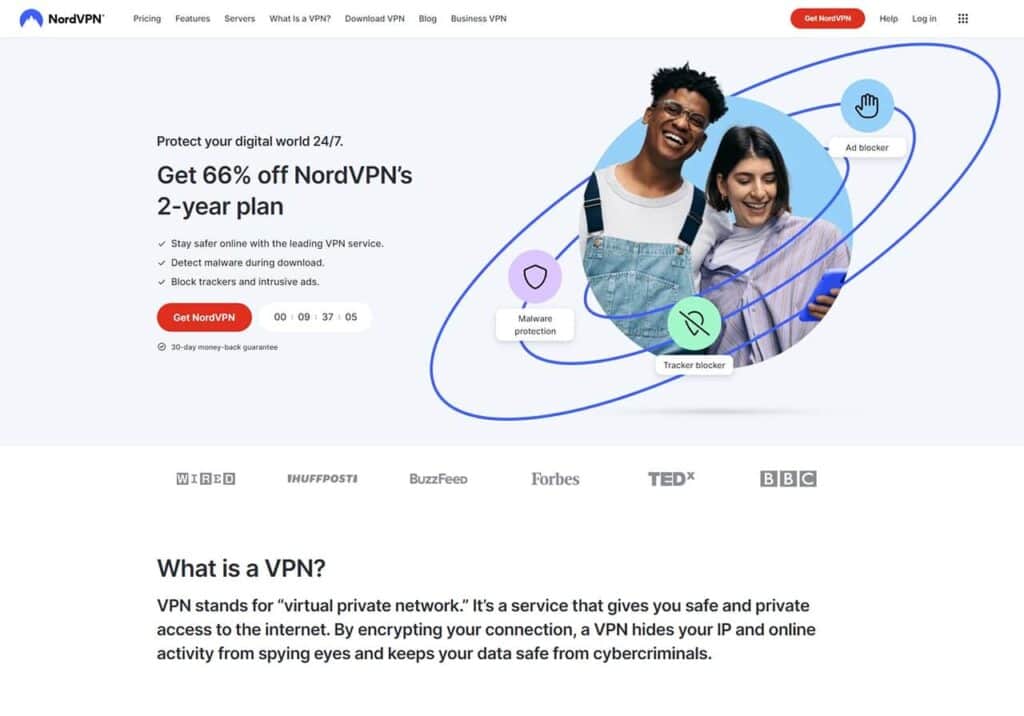
As a man who values his online privacy, I can’t speak highly enough of NordVPN. With over a decade of experience in the industry, it’s no wonder they have become the top choice for travelers worldwide.
What makes them stand out? The fast speeds are courtesy of their wide selection of servers around the globe and strong security features designed to keep your data safe from prying eyes.
Plus, NordVPN has proven its ability to bypass governmental restrictions and unblock geo-restricted streaming services so you won’t miss out on your favorite shows while abroad. They even offer a 30-day money-back guarantee if you’re not satisfied with their service, which speaks volumes about their commitment to customer satisfaction.
Above all, they’ve garnered an impressive rating of 9.6 out of 10 for attributes like speed, security, privacy, and value for money – qualities every vigilant man should prioritize when choosing a VPN service provider.
Surfshark
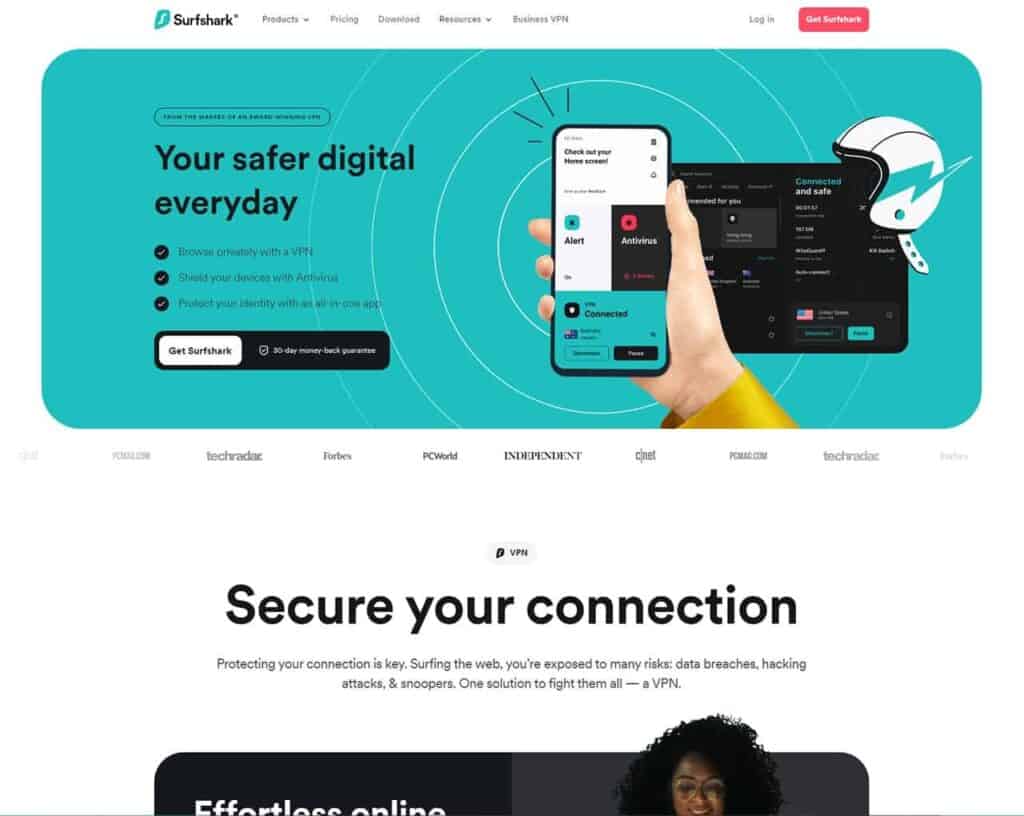
One of the top-rated VPNs for international travel is Surfshark. With its advanced features and affordable pricing, Surfshark is a great option for men who want to protect their data while traveling.
One of the standout features of Surfshark is its support for unlimited simultaneous connections, allowing you to connect multiple devices without any restrictions. It also boasts a growing network of over 3,000 servers in 60 countries, ensuring fast and reliable connections wherever you go.
In addition to providing security and privacy, Surfshark can unblock many streaming platforms so you can enjoy your favorite shows and movies while on the road. And with a budget-friendly starting price of just $2.19 per month, it’s an excellent value for money.
PureVPN

I highly recommend PureVPN as one of the top-rated VPNs for international travel. With its extensive server network and commitment to user privacy, PureVPN ensures a seamless and secure connection for travelers using public Wi-Fi networks during their journeys.
Whether you’re heading to Europe or any other region, PureVPN’s 6500 servers spread across 78 countries provide a wide range of server options to meet your VPN needs.
Setting up and utilizing PureVPN is a breeze, thanks to its user-friendly interface and clear instructions. You won’t have to worry about complicated processes when protecting your devices and personal information while on the go.
And if you’re hesitant about committing, take advantage of PureVPN’s 7-day free trial before subscribing.
Not only does PureVPN safeguard against potential snoopers, but it also grants access to various streaming services that may be restricted in certain regions. So whether you want to catch up on your favorite shows or stay connected with loved ones back home, PureVPN has got you covered at an affordable starting price of just $2.19 per month.
Plus, with their strong security measures and commitment to user privacy as being based in the British Virgin Islands, you can rest assured knowing that your VPN experience will be safe and protected with PureVPN by your side.
ExpressVPN
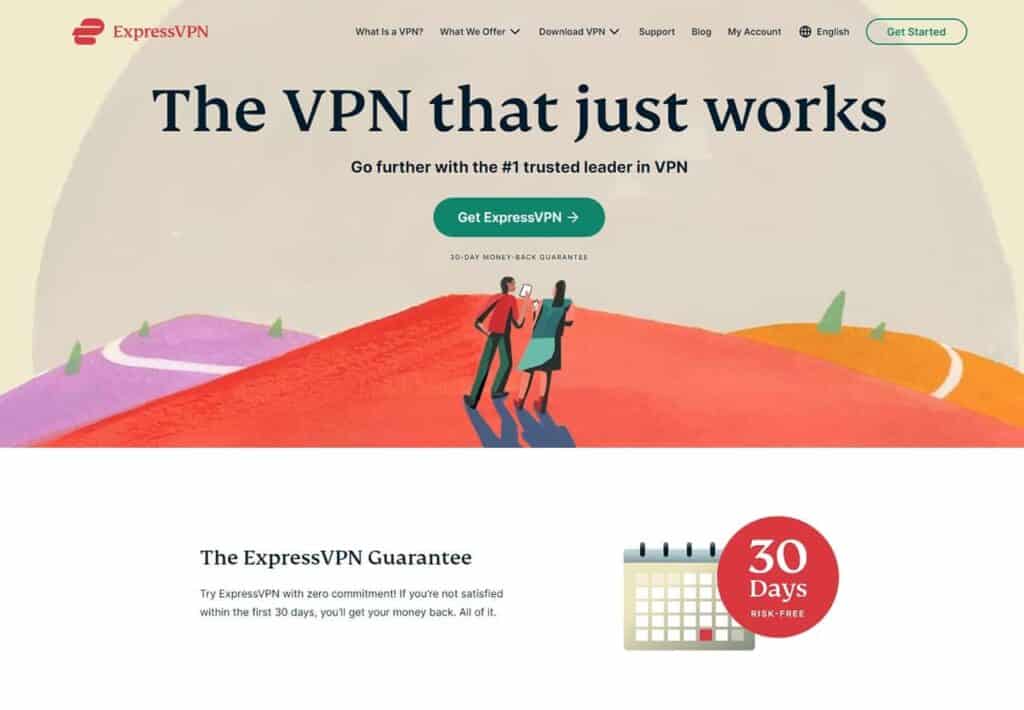
ExpressVPN is one of the top-rated VPNs for international travel. It is known for its strong security and privacy features, making it an ideal choice for protecting your data on public Wi-Fi networks while you’re on the go.
With over 3000 servers operating in 94 countries, ExpressVPN has a large network that can unblock almost anything, making it perfect for streaming your favorite content from anywhere in the world.
Based in the British Virgin Islands, ExpressVPN offers a user-friendly interface and easy installation process. With fast connection speeds and high-level encryption, this reputable VPN service ensures secure browsing even on unprotected public Wi-Fi networks.
CyberGhost
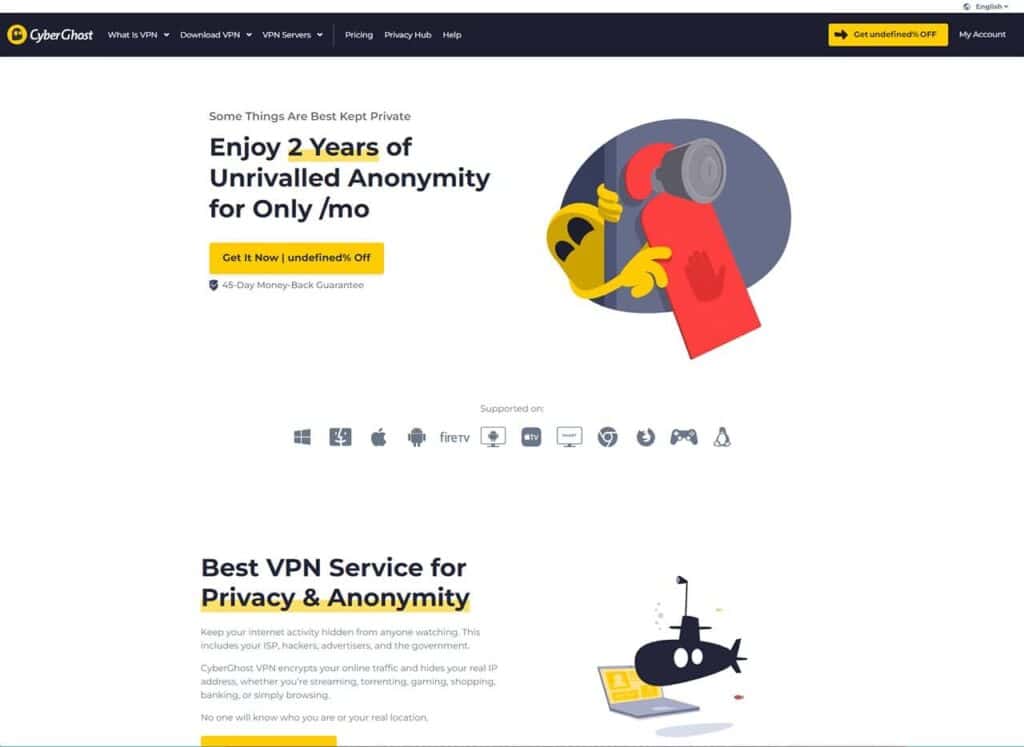
CyberGhost is one of the top-rated VPN services for travelers, offering a range of features to ensure your online security and privacy. With a strict no-logging policy, CyberGhost doesn’t store any IP addresses, giving you peace of mind when using public Wi-Fi networks during your international travels.
In addition, to secure connections, CyberGhost also provides an ad blocker, anti-malware defense, and protection against ransomware attacks to enhance your internet security. You’ll have no trouble accessing geo-blocked streaming sites like US Netflix or BBC iPlayer with their server selection feature.
Plus, CyberGhost is compatible with various platforms like Android, iOS, Windows, Linux, and MacOS so you can stay protected on any device. And if you’re traveling with multiple devices like smartphones and laptops, don’t worry – CyberGhost allows up to seven simultaneous connections on a single subscription.
Criteria for Selecting a Travel VPN

When selecting a travel VPN, consider factors such as the strength of the network, number of simultaneous connections, supported platforms, and ease of installation and setup.
Strength of Network
When it comes to selecting a travel VPN, one crucial factor to consider is the strength of the network. A strong network ensures that you have a stable and reliable connection while traveling, allowing you to browse the internet securely and access blocked websites or apps without any interruptions.
By choosing a VPN with a robust network, you can enjoy faster speeds and smoother performance, even when connected to public Wi-Fi networks. So before hitting the road, make sure to find a travel VPN that offers a powerful network infrastructure for your online protection and convenience.
Number of Simultaneous Connections
Having a sufficient number of simultaneous connections is an important factor to consider when selecting a VPN for travel. This refers to the number of devices that can be connected to the VPN at the same time using a single account.
It’s crucial because it allows you to protect all your devices, such as smartphones, laptops, and tablets, simultaneously while traveling. Reputable VPN providers typically offer multiple simultaneous connections ranging from 3 to 10 or more, ensuring that you can secure all your gadgets without any hassle.
So whether you’re working on your laptop or streaming movies on your tablet during travel downtime, having enough simultaneous connections ensures that all your online activities are protected and free from prying eyes.
Supported Platforms
To ensure a seamless and secure VPN experience while traveling, it’s essential to select a service that supports the platforms you use. Look for a VPN that offers apps for PC, Mac, iOS, Android, Linux, and FireTV.
This way, no matter what device you’re using on your journey, whether it’s your laptop or smartphone, you can stay protected and browse the web privately. By choosing a VPN with broad platform compatibility, you’ll have peace of mind knowing that all your online activities are safeguarded from potential threats lurking on public Wi-Fi networks.
Easy to Install and Setup
Choosing a VPN service for travel that is easy to install and set up is crucial. Nobody wants to spend valuable time tinkering with complicated software while on the go. Look for a reputable VPN provider that offers clear instructions and has a user-friendly interface, making the installation process a breeze.
You want to be able to get your VPN up and running quickly so you can focus on enjoying your travels while knowing your data is protected.
Benefits of Using a VPN while Traveling
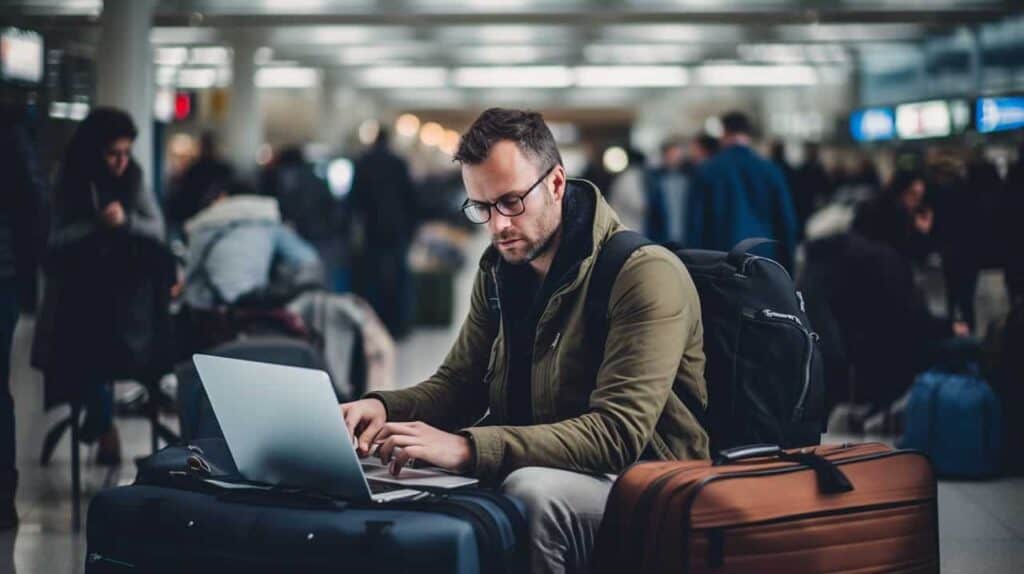
Using a VPN while traveling provides access to blocked websites and apps, improves online security on Wi-Fi networks, helps avoid roaming charges, and even allows you to find cheaper airfares and hotel deals.
Discover these benefits in detail by reading the complete guide below.
Access to Blocked Websites and Apps
One of the key benefits of using a VPN while traveling is gaining access to blocked websites and apps. Many countries have restrictions and censorship in place, which can limit your online experience.
With a VPN, you can bypass these restrictions and browse the internet freely. Whether it’s accessing social media platforms that are blocked or streaming your favorite shows on Netflix from abroad, a VPN allows you to enjoy the internet as if you were back home.
Plus, by masking your IP address, you can avoid location-based price discrimination and potentially score cheaper airfares and hotel deals. Stay connected and explore the web without limitations with the help of a reliable VPN service.
Improved Online Security on Wi-Fi Networks
Using a VPN while traveling greatly enhances your online security, especially when connected to public Wi-Fi networks. These networks can be vulnerable to hackers who have the ability to intercept unencrypted data and gain access to personal information, such as credit card numbers or login credentials.
With a VPN, all of your internet traffic is encrypted, ensuring that your sensitive data remains protected from prying eyes. Additionally, VPNs make it virtually impossible for anyone to trace your online actions back to you, providing an extra layer of anonymity.
By using a trusted VPN service, you can browse the web with peace of mind and stay one step ahead of potential threats.
Ability to Avoid Roaming Charges
One of the key benefits of using a VPN while traveling is the ability to avoid expensive roaming charges. Roaming charges can quickly add up, especially when you’re constantly using data or making calls from your mobile device in a foreign country.
By connecting to a VPN, you can bypass these charges by virtually changing your location and accessing the internet through a server in your home country. This means that you can use local Wi-Fi networks instead of relying on costly cellular data plans, saving you money on international roaming fees.
With a reliable VPN service, you can enjoy seamless connectivity without breaking the bank.
Possibility of Obtaining Cheaper Airfares and Hotel Deals
When it comes to travel expenses, every penny counts. That’s why using a VPN while booking your flights and accommodations can potentially save you some serious cash. By changing your IP address and comparing prices from different countries, you can take advantage of regional variations in airfares and hotel rates.
With the help of a VPN, you can browse the web as if you’re logging in from your home location, giving you access to better deals that might be exclusive to certain regions. So why pay more when you can use a simple tool like a VPN to unlock hidden discounts? Start exploring the world without breaking the bank by harnessing the power of technology and securing cheaper airfares and accommodation options with ease.
Practical Guide on How to Use a VPN When Traveling

Setting up and using a VPN while traveling is crucial to safeguarding your data on public Wi-Fi networks, ensuring online security, and protecting your personal information from potential threats.
Setting Up a VPN
Setting up a VPN is an essential step in safeguarding your data when traveling. To begin, choose a reputable VPN provider that offers user-friendly software compatible with your device.
Install the VPN app and follow the straightforward setup instructions provided. Once installed, launch the app and select a server location from the available options to establish a secure connection.
It’s important to ensure that your VPN is running whenever you connect to public Wi-Fi networks to encrypt all of your internet traffic effectively. By taking these simple steps, you can enjoy peace of mind knowing that your online activities are protected from potential threats while on the go.
Using a VPN on Different Devices
I find it incredibly convenient to use a VPN on different devices while traveling. Whether I’m using my smartphone, tablet, or laptop, having a VPN ensures that my online activities are protected from prying eyes.
With a VPN installed on each of my devices, all internet traffic is encrypted and routed through secure servers, making it virtually impossible for anyone to monitor or intercept my data.
Plus, by connecting to a VPN server in another location, I can easily bypass geo-blocked services and access content that may be restricted in the country I’m visiting. It’s truly an essential tool for maintaining online security and privacy across all devices during my travels.
Troubleshooting Common VPN Issues
If you’re using a VPN while traveling, it’s important to be aware of common issues that may arise and how to troubleshoot them. One common problem is slow internet speeds, which can occur because the data is being routed through a server.
To fix this, try connecting to a different VPN endpoint or switch to a VPN with faster connection speeds. Another issue you may encounter is DNS leaks, where your true IP address becomes visible even when connected to the VPN.
To prevent this, ensure that your VPN has DNS leak protection enabled. Additionally, if you’re having trouble accessing certain websites or streaming services while connected to the VPN, try switching servers or selecting an obfuscated server option if available.
Frequently Asked Questions About Safely Using a VPN When Traveling
Why should I use a VPN when traveling?
Using a VPN when traveling helps protect your data from potential hackers and cybercriminals who may try to intercept your information while connected to public Wi-Fi networks. It creates a secure encrypted connection that keeps your sensitive information, such as passwords and credit card details, safe.
Can I use any VPN service when traveling?
It is important to choose a reliable and trustworthy VPN service provider when traveling. Not all VPN services are created equal, so it’s essential to research and select one that offers strong encryption protocols, has a no-logs policy, and has servers in the countries you plan on visiting.
How do I set up and connect to a VPN while traveling?
Setting up and connecting to a VPN while traveling is usually straightforward. You need to download the appropriate VPN app for your device, sign up for an account with the chosen provider, enter your login credentials in the app, select a server location (preferably one close by), and click “Connect.” The app will handle the rest of the setup process.
Are there any risks or limitations associated with using a VPN when traveling?
While using a VPN provides increased security on public Wi-Fi networks, there are still some limitations worth considering. Some websites or online services may detect that you’re using a VPN and restrict access or require additional authentication steps. Additionally, using certain encryption protocols can slow down internet speeds slightly due to the added layers of security implemented by the VPN technology.
Conclusion
In conclusion, using a VPN when traveling is essential for protecting your data on public Wi-Fi networks. With the increasing risks of cyber threats and identity theft, having a virtual private network ensures that your online activities remain secure and anonymous.
By following this complete guide, you can safely navigate through any public internet connection without worrying about stolen information or governmental spying. Stay protected wherever you go with a reliable VPN service, and enjoy peace of mind while enjoying your travels.
